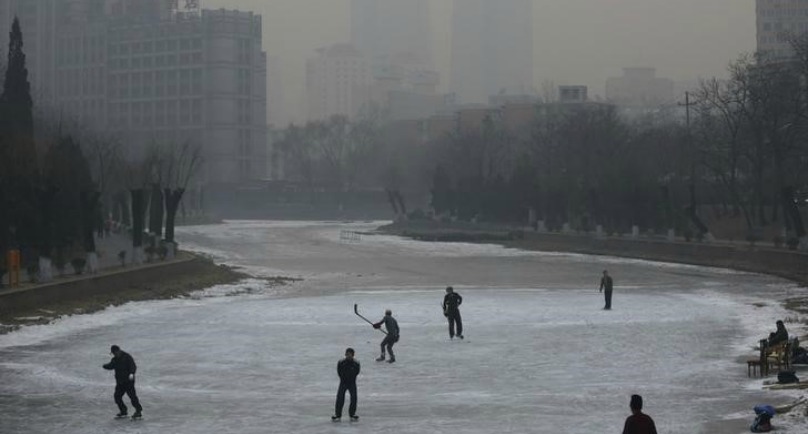Image: Residents skate and play ice hockey on a frozen river amid heavy smog during winter in Beijing, China, December 29, 2015. REUTERS/Jason Lee
![]()
By David Stanway and Kathy Chen
BEIJING (Reuters) – Widespread misreporting of harmful gas emissions by Chinese electricity firms is threatening the country’s attempts to rein in pollution, with government policies aimed at generating cleaner power struggling to halt the practice.
Coal-fired power accounts for three-quarters of China’s total generation capacity and is a major source of the toxic smog that shrouded much of the country’s north last month, prompting “red alerts” in dozens of cities, including the capital Beijing.
But the government has found it hard to impose a tougher anti-pollution regime on the power sector, with China’s energy administration describing it as a “weak link” in efforts to tackle smog caused by gases such as sulphur dioxide.
No official data on the extent of the problem has been released since a government audit in 2013 found hundreds of power firms had falsified emissions data, although authorities have continued to name and shame individual operators.
“There is no guarantee of avoiding under-reporting (of emissions) at local plants located far away from supervisory bodies. Coal data is very fuzzy,” said a manager with a state-owned power company, who did not want to be named because he is not authorized to speak to the media.
The manager said firms could easily exaggerate coal efficiency by manipulating their numbers. For example, power companies that also provided heating for local communities could overstate the amount of coal used for heat generation, which is not subject to direct monitoring, and understate the amount used for power.
“Data falsification is a long-standing problem: China will not get its environmental house in order if it does not deal with this first,” said Alex Wang, an expert in Chinese environmental law at UCLA.
TOUGHER RULES
Beijing has been toughening and extending its environmental protection laws in recent years. Amended legislation which came into force at the start of 2015 gave authorities more power to punish firms and officials responsible for violations, including falsifying data, subjecting them to unlimited fines and threats of closure.
Coal emission violations cost power producers 635 million yuan ($98 million) in lost subsidies and fines last year, while at least 10 thermal power companies have paid 519 million yuan n fines since 2013 for misusing emissions control equipment in order to meet targets and get subsidies.
Last November, China’s environment ministry named two generators in the northeastern province of Liaoning for data fraud as part of a move to publicly shame operators.
In its latest bid to curb pollution, China’s cabinet in December ordered all coal-fired power firms to reduce pollutants like sulphur dioxide by 60 percent by 2020, saying it would close inefficient plants and promote advanced low-emissions technology through subsidies.
As an incentive, it offered increased payments to generators that upgrade facilities, with total subsidies estimated to be worth 42 billion yuan ($6.4 billion) a year.
Yet for power plants already under pressure from crippling overcapacity and slowing demand growth, threats of heavy fines or forced closures also offers a powerful incentive to massage emissions numbers.
HALTING FRAUD
The environment ministry acknowledged in December that “a minority of firms were still manipulating emissions control equipment and falsifying data in an attempt to avoid supervision”.
To help counter fraud, the government has set up continuous emissions monitoring systems that can share real-time pollution readings with authorities, but critics say these can be manipulated and only cover big state-owned firms.
“The coal power sector has strengthened standards ahead of others, but to really motivate the change to happen, the law must be enforced and that depends on data quality,” said Ma Jun, director at the Institute of Public and Environmental Affairs, a non-government organisation that campaigns for improved pollution monitoring in China.
Tougher enforcement was also needed.
“The law is not enough,” Ma said. “It states that they could even be put in jail, but so far we haven’t seen many cases like that.”
Environmental group Greenpeace said in December that some plants it investigated in eastern China’s Jiangsu province even recorded “negative” emissions, according to data submitted to authorities by the companies.
All 12 of the plants it investigated exceeded emission limits on sulphur dioxide and nitrogen oxides in 2015, the group said.
($1 = 6.5772 Chinese yuan)
(Editing by Richard Pullin)
Copyright 2015 Thomson Reuters. Click for Restrictions.


